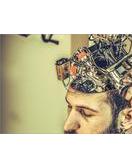I thought we were ready.
Very early in March, I had a conversation with two neurologists in Italy. They had both seen patients with Superficial siderosis, so we were making a connection to share information. One of them commented we had no idea of what was heading here to the U.S. I made a mental note to do a little preparation because that’s my nature.
Hello Bubble
I stocked up on disinfecting supplies- you know, just in case. We already had face masks and gloves on hand. Gary was so prone to catching any bug he came in contact with that masking up was second nature. We hit the road from Texas to Little Rock for his quarterly pain shot, where we were treated to a peek into the future. Welcome to the world of temperature checks and mandatory face masks. It made for a great story when we went home. Can you imagine living like that every day? I had no idea this would be the last in-person appointment for six months.
In April, the phone calls began. The Shreveport Louisiana VA began canceling all of Gary’s appointments. The surgery to repair his active bleed? Postponed indefinitely after being classified as a non-essential procedure. The hematologist who tracks Gary’s chelation blood levels personally called to advise us not to step foot on hospital grounds until August or September. Gary’s bi-monthly testing schedule for blood thinners and Ferriprox were suddenly pushed to eight weeks. Say hello to lockdown world life.
Welcome to Telehealth
I have to be honest, I like the telehealth model. I don’t have to drive 160 miles while carrying Gary to his appointments. It saves on gas, and I don’t lose sleep from my anxiety level shooting sky-high. Heavy traffic or COVID-19, neither is my friend. We also live in an extremely rural area with spotty internet that continuously drops and buffers. So I’ve learned to hot-spot my cell phone and set it out on our deck rail while connected to our iPad in my office. The more significant downside to telehealth is Gary’s hearing loss makes it impossible for him to communicate directly. This is not so different from a typical face-to-face office visit. In either scenario, I serve as his ears and memory.
Our bubble of isolation burst in May when our grandaughter and her baby moved into our home. Gary was introduced to the COVID-19 nasal swab, as was the toddler. So far, everyone has dodged the bullet. Gary’s glasses were a casualty of a nasty fall in June. He had to dig out an old pair to use until in-person appointments were deemed safe for him. His hearing aids also had become close to useless by July.
I felt like a child with their nose pressed against the window, watching the rest of the world.
Shifting Back
In-person appointments are slowly returning. Beginning last week, Gary has been seen by the ophthalmologist. I’m happy to report his nystagmus is not as pronounced as it was three or four years ago. It becomes worse when he is tired or stressed, but he can read more comfortably, and his eyes no longer move continuously.
He visited the audiologist for an updated hearing test. His hearing is still declining, and in January, he will be fitted for his third set of hearing aids in as many years. We saw his endocrinologist this week for an ultrasound. Next week, we will see his neurologist for his Greater Occipital Nerve Blocks. The best news is the message from neurosurgery. The authorization for his surgery expired in June, but they were reapplying. Once a new approval is granted, Gary will finally have his active bleed repaired after a very long and frustrating five-year wait.
After the hospital canceled his surgery, I talked over the possibility of taking a short hiatus from chelation with his hematologist. Gary has always hovered on the upper edge of being anemic. Early on during this chelation process, I had been able to keep his iron level up by iron loading him through his diet on the weekends. As his appetite has diminished, it had become increasingly difficult to get the volume of food down him to keep him healthy. His red blood cell count is low, and his ferritin level has hovered around 7.5 for the past year. He will continue to put chelation on hold until his surgery is complete. Once he has recovered, his hematologist is ready to restart the process. The thought of Gary going through surgery without me by his side is not pleasant, but the positive outweighs the negative.
Will life ever return to normal?
Gary has not stepped foot in a store of any kind since February. I continue opening-hour early morning runs to two tiny local stores and a once a month curbside grocery pick-up. We chose to continue being careful. Returning to doctor offices and the hospital regularly gives us both as much risk exposure as we’re comfortable with for now.

